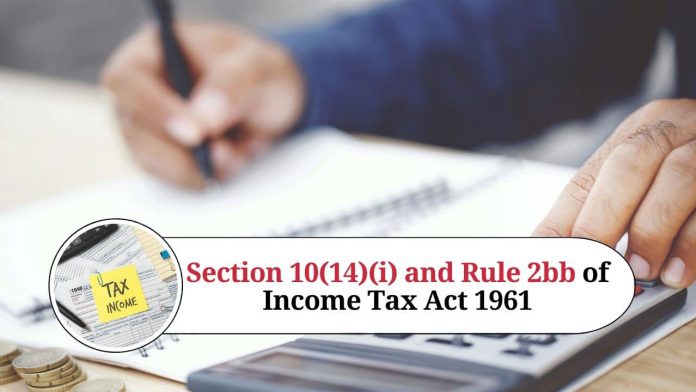Section 10(14)(i) and Rule 2bb of Income Tax Act 1961: An Overview
The Indian Income Tax Act of 1961 governs the taxation of income earned by individuals and entities in India. Section 10(14)(i) and Rule 2bb of the Act provide certain tax exemptions for allowances and perquisites received by employees. In this blog, we will provide an overview of Section 10(14)(i) and Rule 2bb of the Income Tax Act of 1961.
Section 10(14)(i)
Section 10(14)(i) of the Income Tax Act 1961 provides a list of allowances and perquisites that are exempt from tax. These include:
- Conveyance Allowance: Any allowance granted to an employee to meet his expenditure on conveyance from his residence to his place of work and back is exempt from tax. This allowance can be given in the form of cash or as a reimbursement of expenses incurred by the employee. The exemption for this allowance is limited to Rs. 1,600 per month.
- House Rent Allowance (HRA): An allowance granted to an employee to meet the cost of rent for a residential accommodation occupied by him is exempt from tax. The exemption for HRA is the least of the following:
Rule 2bb
Rule 2bb of the Income Tax Rules, 1962 provides the conditions for claiming exemption for certain allowances and perquisites under Section 10(14)(i) of the Income Tax Act. These conditions are:
- Conveyance Allowance: The exemption for conveyance allowance is limited to Rs. 1,600 per month.
- House Rent Allowance (HRA): The exemption for HRA is the least of the following:
- Actual HRA received
- 50% of the salary for employees living in metro cities (Mumbai, Delhi, Kolkata, and Chennai) or 40% of salary for employees living in other cities
- Rent paid minus 10% of salary
To claim the exemption for HRA, the employee must submit proof of rent paid to the employer.
- Leave Travel Concession (LTC): The exemption for LTC is limited to the amount actually incurred on travel. The exemption is available for travel within India and to any place outside India subject to certain conditions.
- Medical Allowance: The exemption for medical allowance is limited to Rs. 15,000 per year. However, the exemption can be claimed only if the employee provides medical bills or receipts to the employer.
- Children Education Allowance: The exemption for children education allowance is limited to Rs. 100 per month per child up to a maximum of two children. The exemption can be claimed only if the employee provides proof of payment of education expenses to the employer.
- Uniform Allowance: The exemption for uniform allowance is limited to the actual amount received or Rs. 5,000 per year, whichever is lower. The exemption can be claimed only if the employee provides proof of purchase or maintenance of uniforms to the employer.
- Special Allowance in certain circumstances: The allowance must be linked to the actual expenses incurred by the employee in the performance of his duties. The employee must provide proof of expenses incurred to the employer.
Conclusion
In summary, Section 10(14)(i) and Rule 2bb of the Income Tax Act 1961 provide exemptions for various allowances and perquisites given to employees by their employers. These exemptions are intended to provide tax relief to employees for expenses incurred in the performance of their duties. To claim the exemptions, the employee must provide proof of expenses incurred to the employer. Employers must ensure that the allowances and perquisites given to their employees comply with the conditions specified in Rule 2bb. It is advisable for employees to consult a tax expert or a chartered accountant to understand the provisions of Section 10(14)(i) and Rule 2bb and to ensure compliance with the Income Tax Act.
Read more useful content:
- section 234e of income tax act
- section 286 of income tax act
- section 90a of income tax act
- section 40a(7) of income tax act
- section 226(3) of income tax act
- section 24 of income tax act
Frequently Asked Questions (FAQs)
- What is Section 10(14)(i) of the Income Tax Act 1961?
Section 10(14)(i) of the Income Tax Act 1961 provides exemptions for certain allowances and perquisites given to employees by their employers.
2. What are the exemptions provided under Section 10(14)(i)?
The exemptions provided under Section 10(14)(i) include allowances for conveyance, house rent, leave travel, medical expenses, children’s education, uniform, and special allowances.
3. What is Rule 2bb of the Income Tax Act 1961?
Rule 2bb of the Income Tax Act 1961 provides the conditions for claiming exemption for certain allowances and perquisites under Section 10(14)(i).
4. What is the maximum limit for conveyance allowance exemption?
The maximum limit for conveyance allowance exemption is Rs. 1,600 per month.
5. What is the maximum limit for medical allowance exemption?
The maximum limit for medical allowance exemption is Rs. 15,000 per year.
6. What is the maximum limit for uniform allowance exemption?
The maximum limit for uniform allowance exemption is the actual amount received or Rs. 5,000 per year, whichever is lower.
7. Can an employee claim exemption for HRA if he/she lives in a house owned by him/her?
No, an employee cannot claim exemption for HRA if he/she lives in a house owned by him/her.
8. Can an employee claim exemption for children’s education allowance for more than two children?
No, an employee can claim exemption for children’s education allowance for a maximum of two children only.
9. Can an employee claim exemption for leave travel concession (LTC) for international travel?
Yes, an employee can claim exemption for LTC for international travel subject to certain conditions.
10. Is it necessary for an employee to provide proof of expenses incurred to claim exemptions under Section 10(14)(i)?
Yes, it is necessary for an employee to provide proof of expenses incurred to claim exemptions under Section 10(14)(i). The employer may require the employee to submit bills, receipts, or other relevant documents to support the claim for exemption.




















